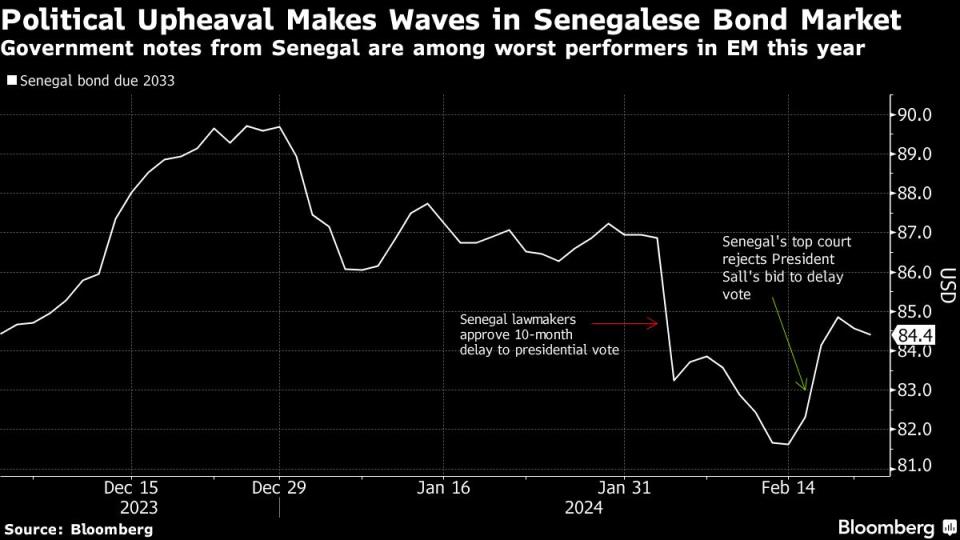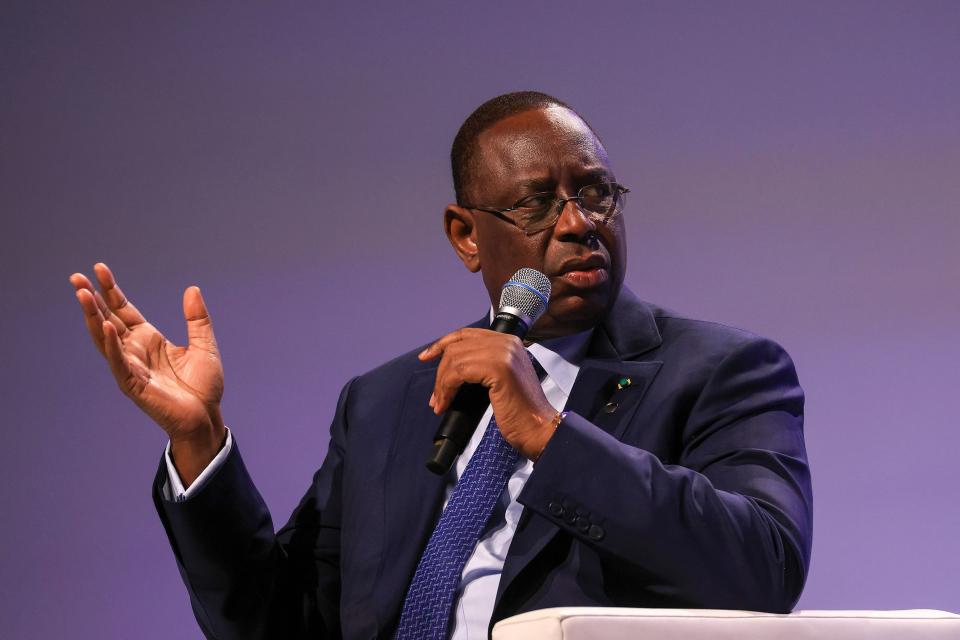Senegal’s Sall Seeks to Calm Tension With Pledge to Step Down
- Oops!Something went wrong.Please try again later.
(Bloomberg) -- Senegalese President Macky Sall pledged to step down at the end of his term, after weeks of turmoil sparked by his attempt to stay in power beyond his term.
Most Read from Bloomberg
US Unveils Biggest Sanctions Package on Russia Since War Began
Blackstone CEO Schwarzman Collected $896.7 Million Last Year
Buffett Sees No Chance of ‘Eye-Popping’ Results With Record Cash
Sall set off a constitutional crisis in the West African country, long thought of as one of the continent’s most stable democracies, when he postponed elections scheduled for this month and lawmakers proposed extending his tenure by 10 months. The government cracked down on mass street protests, arrested opposition leaders and cut off the internet as it tried to contain the fallout.
The president’s attempt to stay also unnerved the country’s democratic neighbors — in a part of Africa roiled by coups — investors and western donors including the US. Neighboring Niger, Burkina Faso, Mali and Guinea are ruled by military juntas that overthrew elected governments in recent years. After weeks of uncertainty in the country, Sall said on Thursday that he will step down when his second term ends on April 2.
But opposition politicians weren’t convinced. Sall’s speech was “unclear, which means more uncertainty,” opposition politician Sokhna Ba said in a text message. “I’m not reassured,” she added.
“It has never been the plan to go beyond my constitutional mandate,” Sall said. “I’m sticking to this and say very clearly and very solemnly, on April 2, I end my time at the head of Senegal.”
But Ba cited Sall’s vowing to step down before his successor could be chosen as a reason to doubt it.
A new election date will be set following two days of consultations with political leaders starting Monday, Sall said. The talks will also determine how Senegal should be governed after Sall steps down and until elections are held. If there’s no consensus, the decision will be referred to the Constitutional Council, the nation’s top court, Sall said. “It’s clear that the country cannot remain without a president,” he said.
Sall earlier this month called off the country’s presidential vote to allow for an inquiry into the process of selecting candidates that could stand in the polls earlier slated for this Sunday.
Lawmakers later sought to amend the constitution to delay the vote for ten months and have the president’s term extended until a successor takes over. That sparked protests and clashes between civilians and the security forces across the country, that claimed at least three lives.
The court later ruled the parliamentary decision was unlawful.
The crisis has also taken a toll on Senegal’s bonds. The nation’s debt is handing investors one of the worst returns in emerging markets this year, with benchmark notes due in 2033 slipping to the lowest since November earlier this month.
The increased political uncertainty in Senegal and West Africa more broadly should weigh on business confidence, Fitch Ratings said in a Feb. 21 report. “Any disruption to fiscal consolidation and reforms could complicate Senegal’s access to funds worth 1.2% of expected GDP in 2024,” the ratings firm said.
Under a $1.5 billion program with the International Monetary Fund, the expectation is that Senegal’s economy will grow by 8.3% this year, a forecast that could now “be at risk,” Fitch added.
Senegal’s constitution states that the office of the president passes to the parliamentary speaker in the event of a vacancy and fresh elections must be held within 90 days.
Under Senegalese law, the election campaign should span 21 days and a vote should be held at least one month before the president’s term expires.
Opposition Supporters
While Sall has been meeting with political leaders to discuss a new election date and whether it will be possible to change the list of contenders, some of his rivals accuse him of dragging his feet in a bid to retain office. The council on Feb. 15 ordered that the vote must be held “as soon as possible.”
The authorities last week began releasing some of the hundreds of activists and opposition supporters arrested during months-long anti-government protests. The demonstrators were particularly enraged by the arrest of opposition leader Ousmane Sonko and his conviction on libel charges, which disqualified him from the vote.
Sall said Thursday he’s willing to release jailed opponents including Sonko.
Sonko, 49, who was widely seen as the main challenger to Sall’s chosen successor Prime Minister Amadou Ba, remains in jail. Sonko has endorsed Bassirou Diomaye Faye, the deputy of his dissolved Pastef party, who has been cleared to run in the election but has also been imprisoned.
--With assistance from Carolina Wilson, Momar Niang and Yinka Ibukun.
(Updates with market developments and opposition comments)
Most Read from Bloomberg Businessweek
Can the Masters of Hipster Cringe Conquer Hollywood With Wall Street Cash?
How Capital One’s $35 Billion Discover Merger Could Affect Consumers
©2024 Bloomberg L.P.



